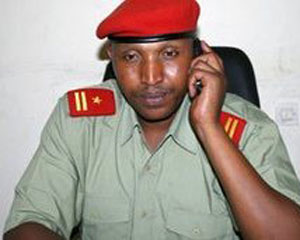
On the retreat in the battlefield, wanted war crimes suspect and Congolese rebel leader Bosco Ntaganda has raised the white flag, fleeing to Rwanda and handing himself into the US embassy in Kigali.
BBC
Known as “the Terminator”, over the last two decades Gen Ntaganda has fought for several rebel groups in eastern Democratic Republic of Congo as well as serving as a general in the Congolese army — and will now face the International Criminal Court (ICC) on allegations of war crimes and crimes against humanity.
It is unclear why he chose to surrender to the ICC — or why he chose Washington’s embassy in Rwanda — neither the US nor Rwanda recognise the tribunal, unlike many other states in Africa and Europe. Apparently, he thought an almost sure prison sentence was better than his other options.
Despite denials by Rwanda’s government, DR Congo has repeatedly accused it of backing Gen Ntaganda.
“The fact that he showed up in Kigali raises a lot of questions. He could have also showed up in Uganda [another neighbour of DR Congo], but he decided to do that in Kigali,” said Thierry Vircoulon, of the think-tank International Crisis Group.
“Was it because it was the only way out or because he also wanted to embarrass his former sponsor?”
Born in Rwanda and raised in DR Congo, Gen Ntaganda and President Paul Kagame’s government in Kigali were once staunch allies, bound together by ethnic ties — both come from the minority Tutsi ethnic group which feels threatened since the genocide that saw hard-line Hutu militias kill some 800 000 people in Rwanda in 1994.
- In Full: Fifteenth post-cabinet press briefing, June 07, 2022
- Health talk: Mandatory wearing of masks can now be scrapped
- Zipra cries foul over vetting process
- Health talk: Let us remain vigilant about monkey pox
Keep Reading
Gen Ntaganda fought for Kagame against Rwanda’s Hutu-led government in the early 1990s.
After Mr Kagame took power in 1994, Bosco Ntaganda served as a bulwark in eastern DR Congo against the Hutu militias that took refuge there after being driven out of Rwanda at the end of the genocide.
Gen Ntaganda also fought the Congolese government, accusing it of oppressing DR Congo’s own Tutsi population living in the east, near the border with Rwanda.
He fled to the US embassy after his M23 rebel movement, which was formed last year after an army mutiny, split last month.
There was heavy fighting between rival factions in eastern DR Congo, which reportedly left General Ntaganda on the back foot.
It is not clear what caused the split, but forces loyal to Gen Ntaganda and ousted M23 political head Jean-Marie Runiga appeared to lose ground to troops allied with the movement’s military chief Sultani Makenga.
An ally of Col Makenga, Col Innocent “India Queen’’ Kahina, told Associated Press news agency that he saw Gen Ntaganda in the battlefield last week.
“We shot at him, but he got away,’’ Col Kahina is quoted as saying. Ntaganda’s appearance in the dock at a fair and credible trial of the ICC would send a strong message to other abusers that they too may face justice one day.
“Apparently, he thought an almost sure prison sentence was better than his other options,” DR Congo analyst Jason Stearns writes on the Congo Siasa blog.
Vircoulon says Rwanda will be worried about Gen Ntaganda appearing in the dock at The Hague.
“He will have a lot of things to say at the ICC and his testimony may potentially be very damaging and could have huge consequences for Kigali.”
For New York-based pressure group Human Rights Watch (HRW), should Gen Ntaganda stand trial, it would help end the culture of impunity in DR Congo.
“Ntaganda’s appearance in the dock at a fair and credible trial of the ICC would send a strong message to other abusers that they too may face justice one day,” HRW Africa researcher Ida Sawyer said.
The DR Congo conflict has been a major focus of the ICC since its formation more than a decade ago, with two cases finalised so far — the acquittal of militia leader Mathieu Ngudjolo Chui in December 2012 and the sentencing some six months earlier of his rival, Thomas Lubanga, to 14 years in jail for recruiting children into his rebel army in 2002 and 2003. Gen Ntaganda was once allied with Lubanga, serving as his chief of staff in the Union of Congolese Patriots (UPC) rebel group.
The ICC issued an arrest warrant for Gen Ntaganda in 2006, accusing him of committing atrocities, along with Lubanga, in 2002 and 2003 — charges that are unrelated to the latest conflict involving the M23.











